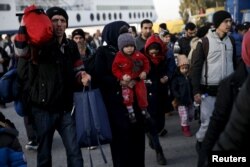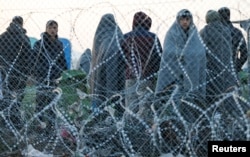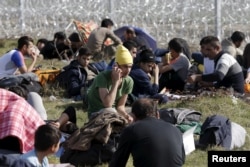Two key international migrant and refugee organizations are drawing attention to the increased number of people escaping war and violence this year.
The International Organization for Migration (IOM) said Tuesday that more than 102,500 people arrived in Greece by the Mediterranean route and more than 7,500 went to Italy since the beginning of 2016.
More than 410 migrants have lost their lives attempting to make the crossing this year. The IOM said the eastern Mediterranean route between Turkey and Greece continues to be the deadliest, accounting for 321 migrant deaths.
Also Tuesday, the United Nations High Commissioner for Refugees (UNHCR) said that its studies found that the highest number of asylum-seekers were Syrians, followed by Afghans and Iraqis.
UNHCR said that 94 percent of Syrians and 71 percent of Afghans who arrived in Greece in January cited conflict and violence in their counties as the main reason for taking such a perilous journey on unsafe boats and dinghies.
UNHCR spokeswoman Karin de Gruijl said some of the key findings of its studies show 85 percent of Syrians were internally displaced before their journey to Greece.
De Gruijl said 65 percent of the Afghans and 47 percent of Syrians who stayed in another country for more than six months had no legal documents.
'Lack of access to jobs'
“The lack of access to jobs that are adequate to their skills, as well as meeting living expenses and avoiding exploitation is the main reason for the Syrians to leave the last country of residence," she said. "The second reason is discrimination. Women and children account for 51 percent of the Syrian arrivals and 40 percent of the Afghans.”
Meanwhile, Greece has formally protested Austria's recent actions involving the migrant crisis.
The Greek Foreign Ministry summoned the Austrian ambassador to Athens to express anger over Vienna's decision to limit the number of asylum applications, which could leave thousands of migrants stranded in Greece.
Athens is also angry over not being invited to a meeting Wednesday in Austria with several Balkan states, including Albania, Bosnia, Macedonia and Slovenia, about the migrant crisis.
Greek actions
On Monday, Greek police began removing hundreds of migrants from a camp at the country's border with Macedonia.
The migrants, most from Afghanistan, were placed on buses bound for Athens early Tuesday, where they will be housed in an army-built camp. Thousands of migrants have been encamped at Idomeni since Macedonia imposed tighter border restrictions.
The UNHCR survey found the majority of Syrians said their country of destination is based on where family members live, but de Gruijl noted it is becoming more difficult for refugees to choose where they want to go because of increasingly restrictive policies by countries.
Referring to Macedonia’s decision not to admit Afghan refugees, she told VOA the UNHCR is concerned about the profiling of refugees at the border.
“We think that refugees and asylum-seekers, their claims should be looked at individually through asylum systems and people should not be selected on the basis of their nationality. They should be selected on whether they are in need of international protection or not," she said.
The deadlock along the Greek-Macedonian border is just a part of the biggest refugee crisis to plague Europe since World War Two.
More than 1 million migrants and refugees, fleeing war and poverty in Syria and elsewhere, arrived in 2015, many of them traveling from Turkey to nearby Greece.
Lisa Schlein in Geneva contributed to this report.

















